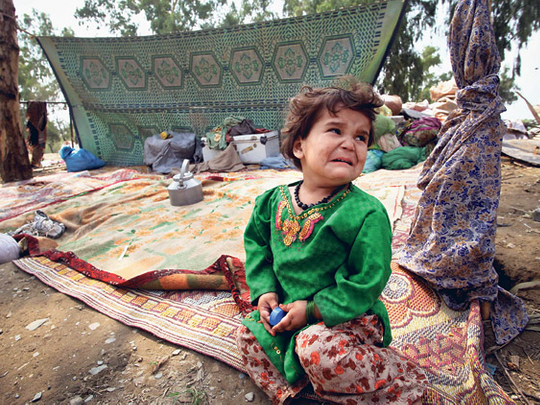
Pakistan's floods have not just devastated the lives of millions of people, they now present an unparalleled national security challenge for the country, the region and the international community.
Lest anyone underestimate the scale of the disaster, all four of Pakistan's wars with India combined did not cause such damage.
It has become clear this week that, unless major aid is forthcoming immediately and international diplomatic effort is applied to improving Pakistan's relations with India, social and ethnic tensions will rise and there will be food riots.
Large parts of the country that are now cut off will be taken over by the Pakistani Taliban and affiliated extremist groups, and governance will collapse.
The heavy rain and floods have devastated the poorest and least literate areas of the country, where extremists and separatist movements thrive. Central Punjab — the country's richest region, where incomes and literacy are double those of other areas — has escaped the disaster. The resentment felt towards Punjab by ethnic groups in the smaller provinces is thus likely to increase.
In Khyber Pakhtunkhwa (KP), formerly the North Western Frontier Province, where both the Pakistani and Afghan Taliban are based, millions of people have lost their homes and are on the move — this just a few months after many of them had returned home after successful military offensives against militants in the Swat valley. Now every single bridge in the Swat valley has been destroyed and the roads washed away.
Across the province, hundreds of kilometres of electricity pylons and gas lines have been ripped out, power stations have been flooded, and at least half of the livestock and standing crops have been destroyed.
All of this will dramatically loosen the state's control over outlying areas, in particular those bordering Afghanistan, which could be captured quickly by local Taliban.
Jobless and helpless
The poverty-stricken plains of southern Punjab and northern Sind, another major recruitment centre for extremists, have also been drowned. Millions of acres of crops have been destroyed and villages washed away. Joblessness and helplessness will lead to more young men joining the militants.
In Balochistan, the country's poorest region, which is beset with a separatist insurgency as well as hosting Afghan Taliban bases, flash floods and heavy rain have destroyed infrastructure and the below-subsistence economy. Baloch separatists are already blaming the government for poor relief efforts and urging a stepped-up struggle for independence.
And the floods have not stopped the rampant violence in the country. The Pakistani Taliban continue to carry out suicide bombings and assassinations and have vowed to wipe out the Awami National Party which governs KP province.
The Taliban are now threatening to prevent Pakistani non-governmental organisations from carrying out relief work, while allowing militant groups who have set up their own relief camps to expand.
In Balochistan, separatist violence goes on, while in Karachi, inter-ethnic killings have continued, with more than 100 murders in the past four weeks.
More than 60,000 Pakistani troops, many of whom were recently fighting the Taliban in KP, and virtually the entire helicopter fleet of the army, are now involved in flood relief.
For months to come the army is unlikely to be in a position even to hold the areas along the Afghan border that it has won back from the militants.
That means the war in Afghanistan is about to become even bloodier. US and Nato efforts to secure southern Afghanistan — and new US troop deployments expected this month in eastern Afghanistan — will be affected, as more militants come across the border. The Taliban see the floods as a huge opportunity for recruitment in Pakistan, rather than a disaster.
The crisis adds urgency to the need for the US and Nato to open talks with the Afghan Taliban.
The floods are more than a natural disaster: they herald a potential regional catastrophe that has to be met with far more determination, generosity and diplomacy than the West has shown so far.
Ahmed Rashid's latest book is Descent into Chaos: the United States and the Failure of Nation Building in Pakistan, Afghanistan and Central Asia.










